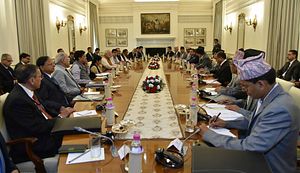Over the weekend, Nepal’s Maoist prime minister, Pushpa Kamal Dahal (also known as “Prachanda”), visited India with high expectations. As I’d discussed last week, Prachanda’s visit had one overarching purpose: to reset the relationship with India, which had gone badly adrift under his predecessor, Khadga Prasad Sharma Oli. With Prachanda’s visit now concluded and a range of modest agreements in place between India and Nepal, it appears that the attempt at resetting ties has been successful.
Most Indian commentary of last week’s state visit has highlighted the cordial and warm interactions between Modi and Prachanda. Prachanda, who once served as Nepal’s prime minister from 2008 to 2009, used to espouse strong skepticism about Nepal’s relationship with India, once describing the foundational 1950 treaty of friendship between the two countries as deeply “unequal.”
All that appears to be in the past. Prachanda evaluted his time in India as a success, noting that it had succeeded in setting the stage for an “environment of trust.” “The visit was more focused on creating an environment of trust with a good intention and effectively implementing the projects for Nepal’s benefits at the earliest as agreed earlier rather than raising many issues,” Prachanda told reporters after landing back in Kathmandu.
Most importantly, Prachanda spoke plainly with Modi about Nepal’s ongoing efforts at implementing the country’s new constitution, which was promulgated last year despite protests from India-aligned ethnic groups known as the Madhesi and the Tharu (among others). “You are aware that my government has made serious efforts to bring everyone on board as we enter the phase of implementation of the Nepali constitution,” Prachanda told me, assuring his Indian counterpart that the resolution to the country’s constitutional crisis, by way of an amendment, was on a stable course.
Modi, for his part, assured the Nepali leader that he believed “Nepal will successfully implement the Constitution through inclusive dialogue accommodating the aspirations of all sections of your diverse society.” The joint statement released after a meeting between the two leaders included a paragraph addressing the constitution, noting that Prachanda “thanked the Government and people of India for their goodwill, support and solidarity in Nepal’s peace process.”
As far as deliverables go, this visit was modest–not only because Prachanda’s objective was to reset ties more broadly, but also because the Nepali prime minister will pass the leadership baton to Sher Bahadur Deuba of the Nepali Congress in eight months’ time, leaving a degree of political uncertainty regarding the implementation of larger initiatives. Nevertheless, India extended a new line of credit to Nepal for $750 million to assist in ongoing reconstruction efforts after last year’s devastating earthquake in April. The two leaders additionally signed a memorandum of understanding to jointly develop and upgrade road infrastructure in Nepal’s Terai region (the plains running along the country’s southern frontier with India). Modi and Prachanda also discussed border security, resolving to ensure that free movement across the India-Nepal border “is not allowed to be misused by unscrupulous elements posing security threats to either side.”
Despite the positivity in the Indian press about Prachanda’s time in New Delhi, there are no guarantees that road bumps won’t reemerge for the bilateral relationship. Since the collapse of Nepal’s monarchy, the country’s politics have been tinged with an increasing degree of skepticism about New Delhi’s intentions and involvement in Nepal. Oli, for instance, who leads the Marxist-Leninists in Kathmandu, lambasted Prachanda’s performance in India, resolving to oppose the joint statement between him and Modi. He’s not alone. After months of strain during the constitutional crisis, many Kathmandu elites continue to remain skeptical of New Delhi.
Prachanda’s claim that an environment of trust has been rebuilt is therefore somewhat exaggerated. Back in Kathmandu, it will be up to the government and its allies in parliament to convince Nepalis of the benefits of enduring ties with India.

































